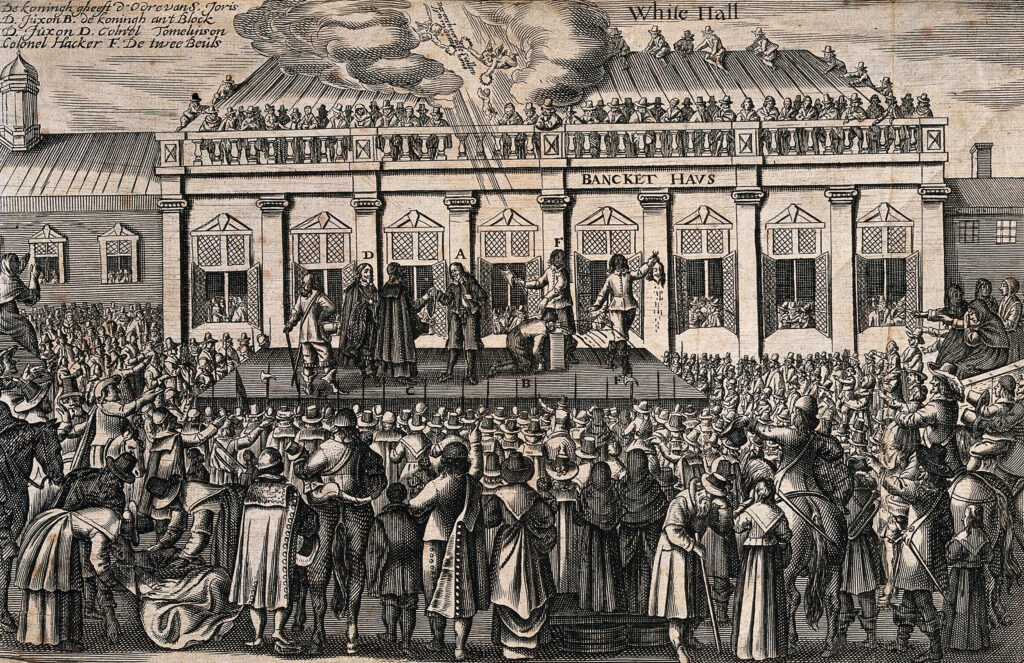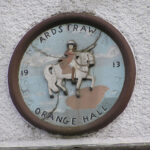20 March 1649: Judge and Yorkshireman Francis Thorpe justifies to the grand jury at York the recent execution of Charles I

Angels hold laurels for Charles I as he is beheaded outside Banqueting Hall, Whitehall on 30 January 1649 (Anon N.d.).
Francis Thorpe. 1744 (1649). Serjeant Thorpe, Judge of Assize for the Northern Circuit, His Charge, as It Was Delivered to the Grand Jury at York Assizes, the Twentieth of March, 1648. The Harleian Miscellany, Vol. 2. London: Thomas Osborne. Get it:
.Unedited excerpt
If an excerpt is used in the book, it will be shorter, edited and, where applicable, translated.
Touching the government of this nation, it hath anciently been monarchical, in the frame and constitution of it; but yet it never was a pure monarchy, for a pure monarchy is a clear tyranny. But it was a political monarchy, or monarchy governed by laws, taking in thereto all the goods, and avoiding all the ills, both of aristocracy and democracy; and so I may truly say, that look upon the frame and constitution of it alone, and, as it were, upon the theoretical and contemplative part of it; and, supposing it possible that the practice would answer the theory, no man can deny, but that it was a frame of most excellent order and beauty. For, first, it had a king, the chief officer, one single person; and therefore, avoiding the proud factions and contentions, usually happening in aristocracy, as likewise, the disordered confusions, common in single democracy; but yet a king bounded and compassed with laws above him, being the rules already made and given him to rule by; and, with a necessity of concurrence and compliance, with Lords and Commons below him, for future legislative power and authority, and so avoiding the danger of tyranny usually incident to monarchies, which commonly makes the monarch’s will the law, and so establishing the government upon this foundation, voluntas lex imperatoris esto.
But, alas! when I have showed you the frame and constitution of the late government, I have showed you all the beauty of it; for, when you come to examine the practical part, you shall find nothing less than excellency or perfection in it. Look into your own stories, and you shall always find the king and great lords, comites suos, as they were called, encroaching upon the people’s liberties and rights, and encroaching to themselves superlative prerogatives and dominion over them. On the other side you shall find again the people struggling to preserve themselves and their own interests, labouring still to avoid the miseries, and to free themselves from the mischiefs of their sufferings.
Comment
Comment
Sounds rather like Milton’s Tenure of kings and magistrates (Milton 1650).
Via Jonathan Healey.
Something to say? Get in touch
Similar
 10 December 1769: Part of the northern ballad about Bill Brown, a Brightside (Sheffield) steelworker and hare-poacher killed by gamekeepers today near Rotherham
10 December 1769: Part of the northern ballad about Bill Brown, a Brightside (Sheffield) steelworker and hare-poacher killed by gamekeepers today near Rotherham 23 January 1643: Thomas Fairfax, the Rider of the White Horse, captures Leeds from the Beast with the help of Psalm 68
23 January 1643: Thomas Fairfax, the Rider of the White Horse, captures Leeds from the Beast with the help of Psalm 68
Comment
Comment
Lots of puzzles here. The porphyry chair is a sign of Rome’s determination never to be fooled again as they allegedly were by Pope Joan:
Succeeding popes were placed in a porphyry-chair with a hole in the bottom, and immediately after the election, their genitals were to be searched by the youngest deacon (Baron 1768).
But here it is just metonymy for the absurd notion that this English Puritan should become pope.
Until the practice was abolished at some point in the 20th century, those granted an audience with the pontiff would kiss his slipper.
I am not sure that “wakeling” is “weakling.”
“You writt and unwritt” may be an allusion to Foxe’s Book of Martyrs re that “viper’s bird,” Bishop Gardiner:
And as touching divinity, he was so variable, wavering with time, that no constant censure can be given what to make of him. If his doings and writings were according to his conscience, no man can rightly say whether he was a right protestant or papist. If he wrote otherwise than he thought, for fear, or to bear with time, then was he a double deep dissembler before God and man, to say and unsay, to write and unwrite, to swear and forswear, so as he did (Foxe 1847)
The editor tells us that “Walkinton” refers to John Nelson, Rector of Walkington, 11 miles northwest of Hull, who married John Sharp’s sister Sarah.
I take Sharp’s “cousin” to be like those of The Huff:
He is a Protector to all distressed Damsels called in our Vulgar Tongue Common Whores, and that he may put a better Gloss on the matter, calleth them Cozens (Head 1673).
Something to say? Get in touch
Search
Donate
Music & books
Place-People-Play: Childcare (and the Kazookestra) on the Headingley/Weetwood borders next to Meanwood Park.
Music from and about Yorkshire by Leeds's Singing Organ-Grinder.


 Bluesky
Bluesky Extwitter
Extwitter